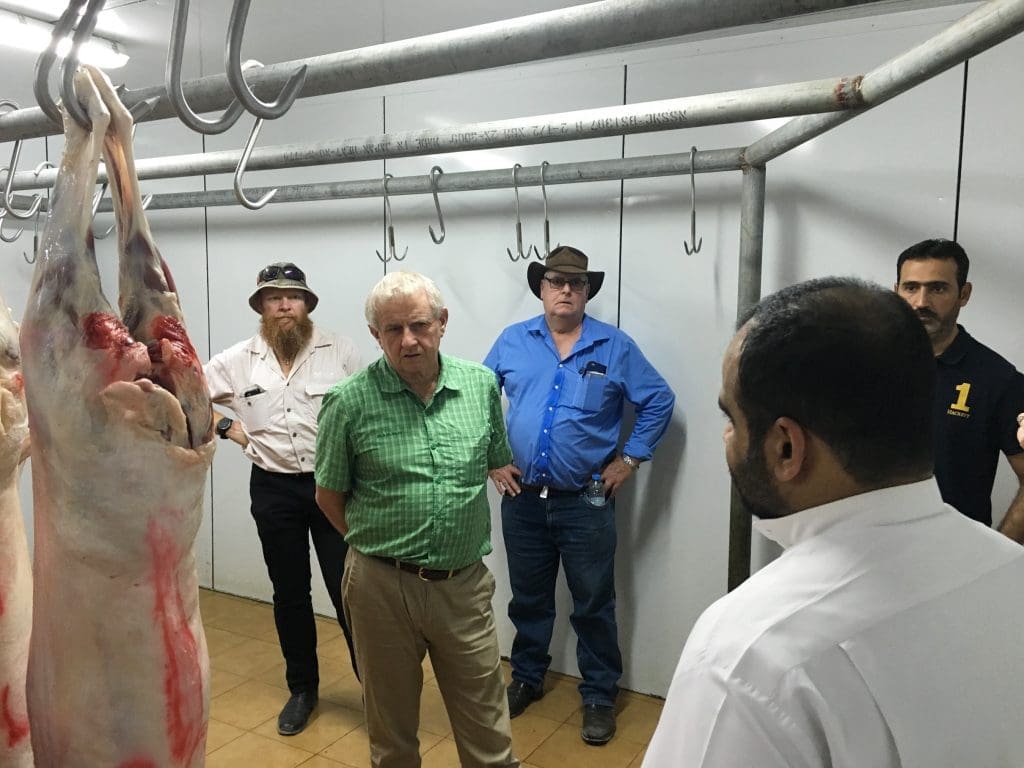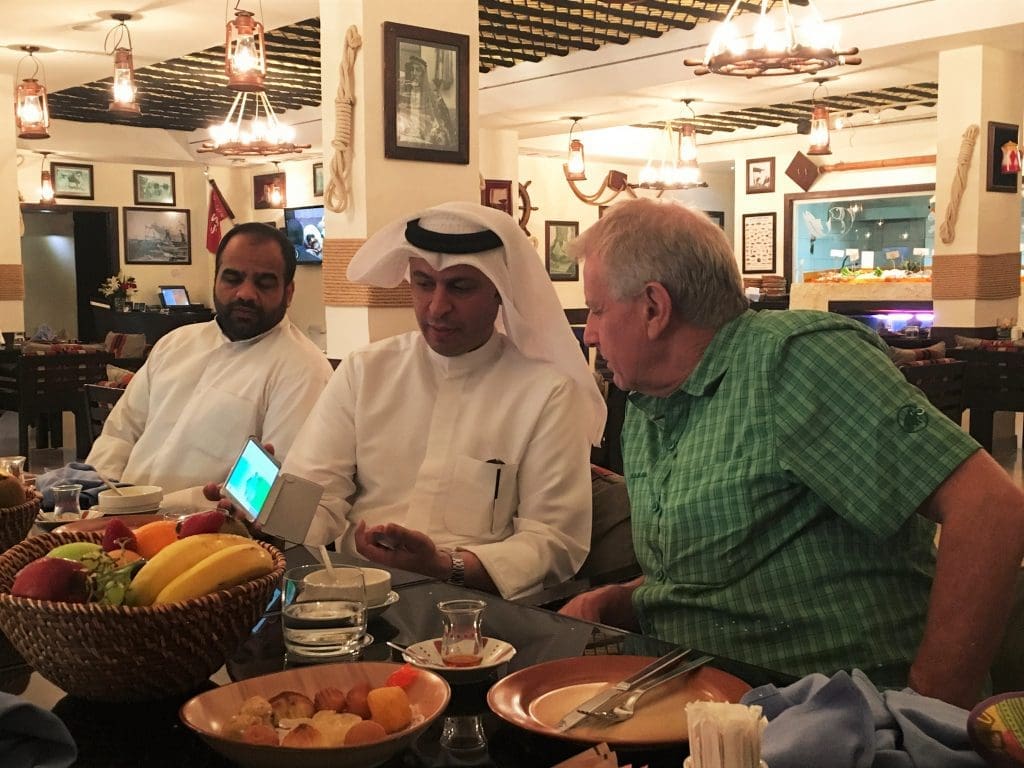
ALEC chairman Simon Crean, pictured (centre) at a cold store in Kuwait last week, as part of an industry supply chain tour which also included Qatar, Bahrain and the United Arab Emirates.
COMMENT
AUSTRALIAN livestock exporters with Middle East supply chains are well advanced in preparations for the annual Islamic festival, Eid al Adha (Eid), which is set to run from September 12-15.
Exporters are this year investing more time and effort than ever to minimise the risks of poor animal welfare practices during the important religious period, which constitutes a significant spike in demand for sheep imported from Australia and elsewhere.
This heightened demand puts pressure on a number of important Middle East markets and increases the danger of Australian sheep being removed, or leaking out, of approved supply chains.
I have just returned from an industry tour of Kuwait, Qatar, Bahrain and the United Arab Emirates, and while I was impressed with what I saw, there is of course never room for complacency in any segment of Australia’s $2 billion livestock export trade.
The ongoing focus of exporters is to work with other stakeholders in the supply chain to identify and control any welfare risks, and respond as quickly as possible to any breakdowns in our market systems.
Not only does Eid place considerable pressure on our world-class control and traceability systems, it also puts the integrity of our Middle East supply chains in the public spotlight.
This is despite the fact that Australian livestock will only make up a small percentage of the overall numbers of animals slaughtered over this year’s festival period, with large volumes imported live to the Middle East from Africa and Europe.
Nonetheless, the ongoing presence of Australian livestock and our industry personnel in the marketplace continues to play a unique and fundamentally positive role in promoting modern, humane slaughter practices and upholding supply chain control and traceability standards – which I believe are the standard-bearer globally in this industry.
Australia is still the only exporting country which puts in place special measures focused on ensuring the welfare of our exported livestock, both for Eid and for normal trading periods throughout the year.
Despite the industry’s best efforts, no system is foolproof and the greatest risk to the welfare of Australian livestock during Eid is leakage from approved supply chains.
Strong demand specifically for Australian sheep and our efforts to place controls on our supply chains creates the potential for profiteers to seek to illegally procure Australian sheep for re-sale on the black market at a premium price.
While any such leakages do not necessarily constitute a failure of the Exporter Supply Chain Assurance System (ESCAS), they do demonstrate the further work that needs to be done to ensure greater buy-in of our standards, expectations and directives by importers and abattoir operators.
We are very mindful of our responsibility to control access to Australian livestock in approved supply chains and always alert to community interest in the welfare of exported Australian livestock.
Poor welfare outcomes can never be condoned nor excused by exporters and it is important that relevant powers regulating our supply chains are exercised in response to any deliberate breaches.
Fortunately, the collaborative work being carried out in-market is proof of just how seriously Australian exporters take their responsibilities through to the point of slaughter. In the first instance, the presence of additional exporter and Live Export Program consultants leading up to and during Eid is again playing a major part in overseeing and managing systems in cooperation with customers and facilities, and help to resolve problems as they arise.
Exporters are working directly with their customers and facility staff to implement livestock management systems to cope with the animal welfare challenges of this peak demand period.
This includes pre-Eid training and support by exporters and LEP representatives to prepare facilities and staff in ensuring the requirements for OIE-compliant handling and slaughter practices continue be met during the high pressure, high demand period of Eid. Australian sheep are traded in restricted supply chains and sales systems, which helps to ensure Australian animals are only slaughtered at approved facilities.
These supply chains operate with the aim of minimising the interaction between customers and the livestock, thus greatly reducing the possibility of animals being removed unlawfully from abattoirs and mishandled.
This year there are a number of important new initiatives directly targeting the leakage risk by further embracing greater vertical integration in the supply chain.
For example, the emergence of closed-loop feedlot and abattoir facilities in the market is a great indication of how seriously our partners in the Middle East are about protecting the long-term prospects of the trade in Australian sheep.
Similarly, investment in modern feedlot facilities which ensure sheep have access to sufficient water, food and shade shows how animal welfare risks like heat stress are being managed.
The ‘Mecca Model’ ticket system in Kuwait, Qatar and Oman, where tickets for carcasses are sold leading up to and during Eid, thus removing all interaction between the livestock and customers, has also been expanded to embrace home delivery.
This is being backed by the launch of a new home delivery app, with the prospect of free transport and slaughter services also on the horizon for future Eid festivals.

ALEC chairman Simon Crean is shown the new home delivery app by KLTT chief executive officer Osama Khalid Boodai during an industry supply chain visit to Kuwait last week.
Exporters are once again also encouraging and supporting charity slaughtering whereby large numbers of Australian sheep are processed at ESCAS facilities and distributed to the poor, thus removing individual sales and selection pressures.
Learning the lessons from previous years, both in terms of successes and failures, is perhaps the trade’s greatest weapon in achieving ongoing improvement.
Australians should be proud of the world-leading role we are playing in the global protein supply chain, especially during culturally significant periods such as Eid. Such progress is only being achieved through the cooperation of exporters, our industry partners LiveCorp and Meat & Livestock Australia, and our customers in the Middle East.
From what I have seen in recent days across the supply chain, especially in the commitment to ongoing improvement I have witnessed from increasingly vigilant importers and abattoir operators, I am confident about the future of Australian sheep exports to the Middle East.
I am grateful to all those who are working effectively to prepare for this year’s festival period and I extend my very best wishes to all of our customers and their families for the coming days.
Simon Crean is the Chair of the Australian Livestock Exporters’ Council. Further information on industry preparations for Eid al Adha 2016 can be found in ALEC’s Information Brief



HAVE YOUR SAY